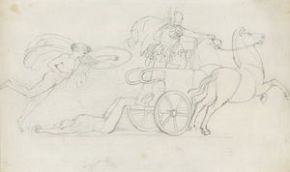“Sing, O Goddess, the ruinous wrath of Achilles,/ Son of Peleus, the terrible curse that brought/ Unnumbered woes upon the Achaeans and hurled/ To Hades so many heroic souls, leaving/ Their bodies the prey of dogs and carrion birds.”
The opening lines of Homer’s The Iliad speak so eloquently of the gruesome tale of defeat, deceit, and death that surround the infamous Trojan War. The epic poem is nothing short of a tedious read that takes an infinite amount of hours to not only read, but also comprehend. In fact, I would not recommend to anyone to read the tale unless they have come into a great deal of money and need something “to do” or if they are looking for answers to any life question they may have.
Unfortunately for me, I volunteered to read the epic poem because I read a few of the books (what Homer called modern day chapters) my sophomore year in high school. I figured if I could handle the three chapters I read and discussed in high school, then hell, why couldn’t I handle this in college? Oh man was I sorely mistaken…
I am in no means discouraging anyone from reading this beautifully written masterpiece. However, as I previously stated, I would not read this unless you have a great deal of time on your hands because research is involved in order to comprehend what Homer is referring to. Ever heard of the phrase, “over my head?” Yes, this occurs more then I had wanted it to. Every line of the poem I read I had to reread in order to understand it. This is where most of my time was spent, researching what the hell I just read because I did not comprehend anything. Also to keeping all the characters in line because there is a fair share of Gods/Goddess and rulers and warriors and family members and so on.
All of the complaining aside, I am pleased with myself that I took the time to read Homer’s epic tale that inspired so many historians to look at the Trojan War in a new light, myself included. Furthermore, an epic tale that invoked many talented artists to interpret the tale in their own way.
From reading the poem and the broken down interpretations many scholars offer, it is easy to understand why artists were influenced by such an arduous read. Homer’s written piece of history has many themes ranging from the glory of war to impermanence of human life and all its creation to military glory over family life. Thus, how the various artistic interpretations answer the question I begged at the beginning of the project: how the epic poem answers the question why artists felt compelled to retell the grandeur moments from the Iliad in their own pieces of art.
Therefore, the next four blog posts will no longer involve any complaints from me, but rather discuss various pieces of artwork that depict a moment from the Iliad. I will first begin with the infamous ancient pottery then continue onto John Flaxman’s natural composition. From those two posts, I will then analyze Peter Paul Ruben’s interpretation of Achilles slaying Hector to finally the more recent adaptation of the tale into the horrid movie, Troy.
